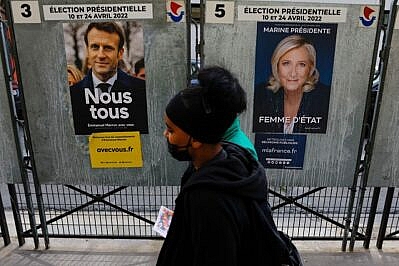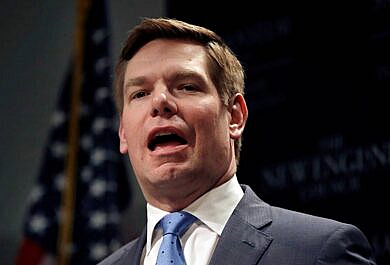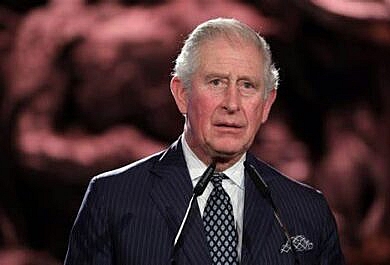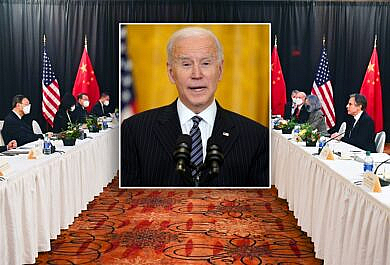French President Emmanuel Macron will face off with far-right leader Marine Le Pen in France’s presidential runoff election on April 24.
Summary
French President Emmanuel Macron won the first round of France’s presidential election Sunday. Macron will face second-place finisher Marine Le Pen in the April 24 runoff.
- Macron’s “abrasive style” and Le Pen’s softened image have contributed to what polls predict will be a highly competitive April 24 runoff election compared to Macron’s landslide victory over Le Pen in the 2017 runoff.
- Most of the 12-candidate field has backed Macron, including conservative 5th place finisher Valerie Pécresse. Far-left candidate Jean-Luc Mélenchon finished a strong third and warned his supporters “You must not give a single vote to Marine Le Pen” but did not endorse Macron.
- The vast majority of votes went to one of three broad camps: the far-right, the far-left, and Macron.
- Macron campaigned as the candidate of “realistic centrism” compared to the “nationalist extremism” of far-right contender Marine Le Pen and the “utopian extremism” of far-left candidate Jean-Luc Mélenchon.
- Le Pen called the runoff “a fundamental choice between two opposing visions of the future.” Le Pen campaigned to fight the rising cost of living, significantly reduce immigration and limit public religious expression for Muslims.
- A Le Pen victory could have repercussions for NATO. Le Pen has stated she wants to pull France out of the alliance’s command structure, has close ties with Russian dictator Vladimir Putin and her party is still repaying a substantial loan from a Russian bank.
![]()
- The New York Times noticed that extreme parties of the left and right took 51 percent of the vote in the first round, and an “anti-NATO and more pro-Russia France” could “fracture the trans-Atlantic response to the Russian invasion of Ukraine.”
- The Guardian profiled both Macron and Le Pen, outlining their records and policy positions.
- CNN focused on the rematch between Macron and Le Pen and what has changed since their last face-off five years ago.
![]()
- Fox News reported Macron’s potential defeat could have negative repercussions for NATO and the West’s response to Russia’s invasion of Ukraine.
- The Wall Street Journal stated “widespread anxiety” over the cost of living helped Le Pen surge in the final weeks, and inflation is set to be the chief issue of the two-week runoff campaign.
- Breitbart was perplexed by conservative fifth-place finisher Valerie Pécresse’s decision to endorse President Macron instead of “fellow conservative Marine Le Pen.” Pécresse’s decision makes more sense if one considers that Le Pen’s big-spending, protectionist, welfare-state economics are closer to traditional left-wing economic policies unlike the pro-business Macron.
Author’s Take
The first two decades of the 21st century have seen the utter collapse of the France’s traditional two-party system. In the postwar period, the center-left Socialist Party (Parti socialiste, PS) and a center-right party currently known as The Republicans (Les Républicains, LR) competed for power. The first cracks appeared twenty years ago, when in a shocking upset the far-right nationalist National Front (Front national, FN) edged out PS for the right to face incumbent conservative President Jacques Chirac in the 2002 presidential runoff. FN’s leader, Jean-Marie Le Pen, was considered an extremist with a reputation for anti-Semitism and lost in a historic 82-18 landslide to Chirac.
In the twenty years since Chirac won his second and final term in 2002, no French president has won reelection. Conservative President Nicolas Sarkozy (LR) lost reelection in 2012 and is currently under house arrest after a conviction for corruption. His left-wing successor, François Hollande (PS), abandoned reelection in the face of an approval rating of 4 percent (not a typo). Conservative corruption and socialist failings in the face of Islamist terrorist attacks and on the economy led to the wholesale collapse in support for both major parties from 2017-2022. In Sunday’s first round election, The Republicans’ Valerie Pécresse secured a 5th place finish with a measly 4.8 percent while PS nominee Anne Hidalgo, the Mayor of Paris, mustered an anemic 1.7 percent of the vote, good enough for 10th place.
The destruction of the two-party system gave rise to new candidates of the far-left, far-right and center. Ex-Socialist minister Emmanuel Macron (a first-time candidate and political outsider in a marriage with a 24-year age difference – sound familiar?) stormed to victory in 2017 at the head of the brand new centrist party La République En Marche! (transl. The Republic On The Move!). While Macron was once a Socialist, he has moved rightward in office and he and his party are now seen to be on the center-right. Populist Jean-Luc Mélenchon of the far-left party La France Insoumise (closest translation: Unsubmissive France) surged from a fourth-place finish in 2017 to finish narrowly behind Le Pen for third place, with 22 percent. Mélenchon seems to have absorbed much of the PS’s former voting base, along with Yannick Jadot of the Green Party (6th place, 4.6 percent).
Le Pen’s daughter Marine Le Pen worked to purge FN and its successor, National Rally (Rassemblement national, RN) of the more unsavory elements from her father’s era, while retaining the party’s anti-immigration, nationalist, and economically statist/socialist core beliefs. This helped RN make the runoff in 2017 but was not enough for Le Pen to stave off a landslide 66-33 defeat in the second round to Macron. Le Pen père making the runoff in 2002 seemed like a fluke at the time. However, FN/RN has steadily increased its support since 2007. A Le Pen has now made three out of the five runoff elections held in the 21st century. This time, Marine Le Pen was assisted by far-right fourth-place finisher Éric Zemmour of the new Reconquête! (Reconquest!) party who made even Le Pen seem moderate by comparison.
Aside from the traditional parties’ collapse, the main feature of 21st Century French politics is its steady move rightward. France elected a socialist president as recently as 2012, but in 2022 candidates of the center-right to far-right (Macron, Le Pen, Zemmour, Pécresse, and a minor candidate) combined for 65 percent of the first-round votes. The French public has sided with the right on the most important issues of the day – national identity, immigration, Islam and the economy. According to polls, Emmanuel Macron and Marine Le Pen are neck-and-neck ahead of the April 24 runoff, a far cry from Macron’s blowout runoff victory five years ago. Will Le Pen prove mightier than Macron? No matter the winner, expect France to continue its right turn for the next five years.
© Dominic Moore, 2022






